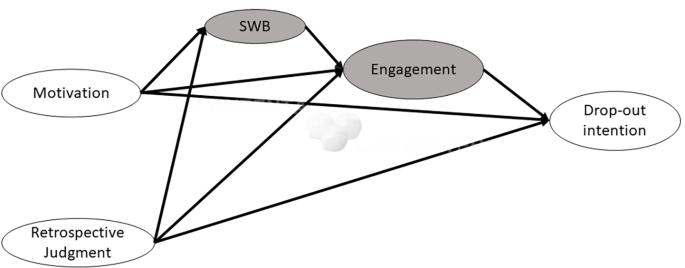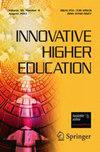大学一年级学生退学意向与学业投入的关系研究:动机、主观幸福感和学校经历回顾性判断的作用
IF 2.4
Q1 EDUCATION & EDUCATIONAL RESEARCH
引用次数: 0
摘要
摘要本研究考察了大学一年级学生学业动机、学校经历回顾性评价、主观幸福感、敬业度和退学意向之间的关系。本研究采用自我决定理论、SInAPSi学术投入模型、享乐方法和回顾性判断过程作为框架。最终样本包括565名参加科学-技术-工程-数学(STEM)课程(生物学、生物技术、化学、计算机科学、物理、数学)的一年级意大利学生。我们检验了三个基于结构方程的中介模型来分析所提出变量之间的关系:动机作为辍学意图的前因由,只有承诺作为中介(模型1);模型1 +主观幸福感作为第二中介(模型2);模型2 +回顾性判断作为前因(模型3)。结果表明,在所有模型中,更自主的动机风格预测学生的投入,进而直接或间接地影响他们的退学意愿。在模型2中,主观幸福感在动机、敬业度和退学意向之间起中介作用。在模型3中,我们发现主观幸福感也完全介导了回顾性判断与敬业度之间的关系。总的来说,我们的研究结果为大学学生参与和退学的机制提供了新的见解,并可能为大学政策提供信息。本文章由计算机程序翻译,如有差异,请以英文原文为准。

Examining the Relation Between First-year University Students’ Intention to Drop-out and Academic Engagement: The Role of Motivation, Subjective Well-being and Retrospective Judgements of School Experience
Abstract This study examined the relationships between first-year university students’ academic motivation, retrospective evaluation of school experiences, subjective well-being, engagement and intention to drop out. Self-determination theory, the SInAPSi model of academic engagement, the hedonic approach, and the retrospective judgment process were used to frame the study. A final sample of 565 first-year Italian students enrolled in Science-Technology-Engineering-Mathematics (STEM) courses (Biology, Biotechnologies, Chemistry, Computer Science, Physics, Mathematics) was included. Three mediation models based on structural equations were tested to analyse the relationships between the proposed variables: motivation as an antecedent of dropout intention with only commitment as a mediator (model 1); model 1 + subjective well-being as a second mediator (model 2); model 2 + retrospective judgement as an antecedent (model 3). The results showed that in all models the more autonomous motivational styles predicted students’ engagement, which in turn directly and indirectly influenced their intention to drop out. In model 2, subjective well-being acted as a mediator of the relationships between motivation, engagement and dropout intentions. In model 3, we found that subjective well-being also fully mediated the relationships between retrospective judgement and engagement. Overall, our findings provide new insights into the mechanisms underlying student engagement and dropout at university and may inform university policy.
求助全文
通过发布文献求助,成功后即可免费获取论文全文。
去求助
来源期刊

Innovative Higher Education
EDUCATION & EDUCATIONAL RESEARCH-
CiteScore
4.30
自引率
9.10%
发文量
46
期刊介绍:
Innovative Higher Education is a refereed scholarly journal that strives to package fresh ideas in higher education in a straightforward and readable fashion. The four main purposes of Innovative Higher Education are: (1) to present descriptions and evaluations of current innovations and provocative new ideas with relevance for action beyond the immediate context in higher education; (2) to focus on the effect of such innovations on teaching and students; (3) to be open to diverse forms of scholarship and research methods by maintaining flexibility in the selection of topics deemed appropriate for the journal; and (4) to strike a balance between practice and theory by presenting manuscripts in a readable and scholarly manner to both faculty and administrators in the academic community.
 求助内容:
求助内容: 应助结果提醒方式:
应助结果提醒方式:


